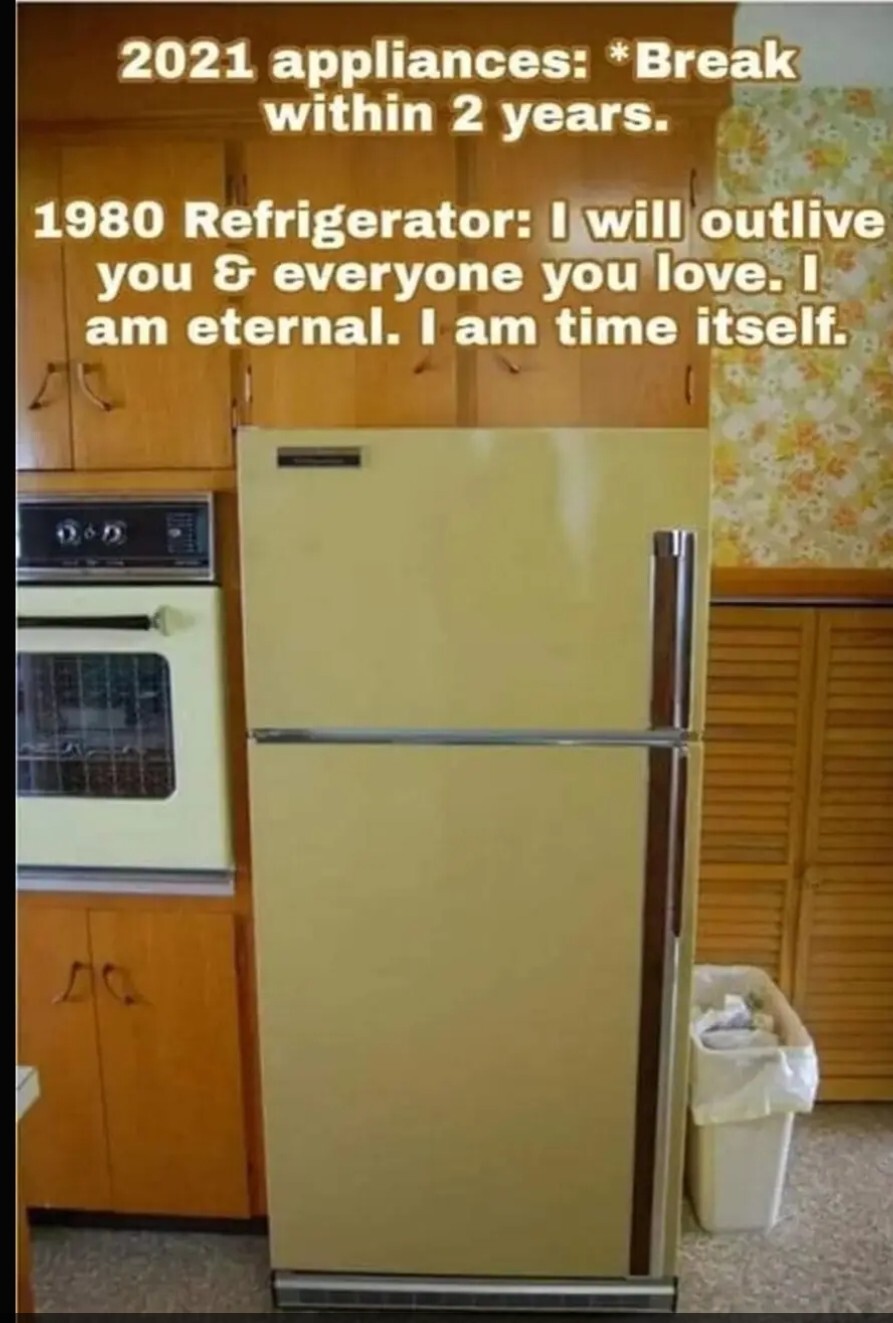- cross-posted to:
- [email protected]
- cross-posted to:
- [email protected]

Will use 4x as much electricity though, ugh.
https://www.cleanenergyresourceteams.org/your-old-refrigerator-energy-hog
Anyone know of any refrigerators today that are as durable as older ones and have today’s efficiencies, but without the smart features and other junk?
Average refrigerator today still lasts 13 years though, and while they’re made cheaply they also are cheaper (at least as a portion percentage of the average paycheck).
https://reviewed.usatoday.com/dishwashers/features/ask-the-experts-why-dont-new-home-appliances-last
Sub Zero, Thermador… High end refrigerators, just look at the price, we decided to forget the idea because of that.
well yeah, we generally make less money now, and manufacturers make more, relatively speaking. we got priced out of quality goods.
I’ve heard that in the US fridges are generally different, with stuff like active fans and nonsense like that. Is that true?
Because every fridge I’ve seen in Europe is mechanically extremely basic and I’ve literally never seen or even heard of one breaking. In my experience fridges are one of the only things that have remained phenomenally simple in design and extremely unlikely to break.
If someone told me their fridge broke, I’d genuinely assume they were lying. That’s how reliable they are.
Well there are evaporator fans in modern refrigerators in the US. They serve an important role though helping with defrosting, improving cooling efficiency, and evenness of cooling throughout the fridge.
https://refrigeratorguide.net/maximize-cooling-efficiency-best-refrigerator-evaporator/
Usually only very small refrigerators are without them now.
It is another point of failure though, but should be pretty easily repairable. I mean it’ll still be able to cool without the fan, but it’ll be running much more to try and compensate and keep things cool though.
If you know the YouTube channel technology connections, here’s a fun video of him messing around with a fanless style refrigerator:
Every LG and Samsung major appliance I’ve had has broken within 5 years.
Refrigerators, washing machines, and dryers.
Prior, I only ever had 80s era American tank energy hogs. Switched back to American brands in the last few years, so too soon to tell if they’ll work out better…
Here’s to hoping.
Oh, and having dealt with LG warranty for both electronics and major appliances, I’ll never buy another LG product that isn’t a monitor.
LG monitors are the only higher end LG product’s I’ve owned that have survived well past the warranty date.
I think Samsung is generally considered trash now. I certainly will never buy any of their “smart” objects either, especially not an ad-ridden TV.
I can confirm Samsung appliances are complete trash. Every single one I’ve owned has either died or had a non-replaceable part fail within a couple years. We had a Samsung fridge at one point and one of the door switches failed. No big deal right, easy to replace? No, apparently Samsung used some kind of custom switch instead of the bog standard cherry contact switch that basically everything and everyone has used for decades, and it’s no longer being manufactured.
My dad bought me a ridiculously expensive (like $400) Samsung vacuum that I loved. It was strong, it came apart in really cool ways to make it versatile, etc.
It failed in less than a year.
The $60 Walmart special Bissell that I went and bought to replace it lasted for 8.5 years before the motor burned out (I screwed up and it got too much pet hair in it). I bought the same one again and it’s going on 5+ years with no issues.
Samsung certainly seem very aware of return window timing. 8.5 years is much better!
I wish some of this stuff was more standardized. In an ideal world one should be able to just replace a motor and keep on going. (Like without needing to learn any wiring and so on.)
I’m gonna offer some contrary evidence: I have a Samsung from 2013 that’s still working perfectly. It did have an issue with the icemaker seizing up, but they have a program where they send a tech out to repair it for free, which I took advantage of. The newer appliances can last a long time in some cases.
There’s also many old fridges that did die, including multiple of mine growing up in the 80s. You just see the ones that happened to survive.
Samsungs don’t just fail; they are incredibly precisely engineered to fail on purpose not too long after the warranty ends.
I had a Samsung front-load washing machine that failed after maybe six years or so: the drum quit turning and it started making a terrible banging noise instead. I decided to take it apart to see what went wrong. Every single part in it was pristine and in perfect working order – electronic parts, mechanical parts, rubber parts, plastic parts, even the stainless-steel parts exposed to the water and detergent all that time – everything looked brand-new.
That is, except for the “spider arm,” which is the large bracket that connects the axle to the drum. That one single part was made out of a completely different kind of metal and had corroded completely through. It was blatantly designed not to stand up to water and detergent. The excellent condition of the metal in the rest of the machine showed that they were perfectly capable of choosing the right material for the job, but deliberately chose not to. It was the most brazen, shameless instance of planned obsolescence I’ve ever heard of before or since.
(Not my pic, but it looked pretty much like this – except mine was in three wholly separate pieces! And, as I mentioned, the axle and drum were shiny and brushed, respectively, with zero rust or residue of any kind at all.)
Wtf?
Think I’d be making an aluminum or stainless plate to put on there and use through-bolts to mount it with some silicone to seal them.
It’s true. I fixed a Samsung LED TV that wouldn’t turn on. They used a tiny resistor that I thought was a fuse.
That resistor was chosen so that it always ran hot and failed after about 3 years of normal use. I put in a bigger one with the same resistance that stays cold and now have the TV for 5 years.
For washing machines, buy used Speed Queen commercial units.
They cost as much as new consumer high end units, but they’re designed to be repaired, plenty of parts available, and they don’t break in the first place.
The Speed Queen small washers at my local laundromat are about $2500 on the used market (in good running condition, with known hours on them). They’re quiet, and don’t shake for any reason.
Even those can have duds. My very first ultrawide was an LG, paid more money for it than any other monitor in my life because I’ve never had a montitor fail.
Died after 1.5 years and the warranty was only a year. I was so pissed.
That is extremely unlucky but also sucks that the us won’t enforce bigger warranty windows for products meant to last much longer than a year.
First mistake was to not look at what repairman recommend because none of them will tell you to buy either brands, they’ll tell you to buy from the Whirlpool family if you’re going for “low cost” brands (vs brands like Bosch, Sub Zero, Miele…)
I bought an expensive Samsung microwave thinking it would outlast the cheaper ones. The thing actually started to rust in the first few months something not even the cheapest microwaves have done on me.
Last Samsung appliance I’ll ever buy luckily I’m in the UK and got my money back.
I mean there’s so many different fridges you can buy but I’ve only heard of two dying. One was a compressor issue but that’s all I know about it. The other one was a valve or something went bad but with the help of youtube my brother was able to diagnose it and replace the part. Apparently that’s the most common failed part on at least that brand of fridges
After some decades they just become so incredibly gross no one without a hazmat suit would try cleaning it again, so they’re replaced.
deleted by creator
The only durable ones are industrial refrigerators like they have at restaurants. Other than that, at least in the US, avoid Samsung and LG (have compressor issues) and buy American made (better build quality). But you’re looking at 10-15 years regardless. Some other notes:
- ice machines should be in the freezer, if you have one
- the fewer the features, the more reliable it is
- Maytag and Whirlpool are pretty reliable
Buy a chest freezer and convert it
Or buy a fancier chest freezer that can swap to a fridge with a button press
Got mine for Xmas 2 years ago, cost like 800 bucks? Bigger than a normal fridge, uses $2.78/month in electricity in freezer mode here in expensive electricity land
Downside: you have to dig for you shit. Upside: in the summer, good
I don’t know for the US market but for French/European market there is a database of the reliability and reparability of appliances brands.
I haven’t looked at the statistical data on this myself, but there’s something to be said for survivorship bias.
Not to mention those old fridges are Horribly inefficient on energy
Can confirm. Use a fridge from 1974. 2 years ago thermostat failed. Replaced with digital one for $15. Now have a nice digital readout of the temps. Thing uses
180W100W when running, less than bigger newer ones.
It’s even more ecological to keep it running since it still has the nasty ozone layer killing coolant that would partly evaporate when trashing it.EDIT: 100W just checked the type plate.
Luckily I’m pretty sure we are at least on an up trend when it comes to the ozone layer so even when eventually it kicks the can you don’t need to worry too much about that anymore. Now we just gotta fix carbon emissions.
My grandparents had one of those old locking fridges from the 50s or so. It weighed like a metric ton, but that fucker NEVER broke.
Removed by mod
Time to make a billion dollars on something else, then start up a car company designed to fail. No investors, design a car for a 60-70k buying price, few bells and whistles, but built to last indefinitely with basic maintenance. Start the company planning to practically close it down just after the last preorder customer has their car delivered and become a maintenance company with a few employees to make replacement parts and install them. If demand rises, redesign for the new times, ramp up and do it all again.
“Why do you hate freedom? And America? And puppies? And apple pie?” -Republicans, probably
Who wants an infinite lifespan car anyway? Everything else would be getting safer and more fuel efficient. Might as well get around on horse and buggy.
For one most engines are pretty much at their peak efficiency, for two practical safety features reached peak between the mid 90s to the early 00s. Most modern safety features are ironically enough not all that safe, for example lane assist makes people pay less attention or it tries to assist in the lane and overcorrects. I see the latter rather frequently in my area since windy roads, usually the damned things are trying to avoid the white lines of the shoulder and overcorrect over the yellow.
I think modern safety standards alone would cost a few hundred million in research, or make it necessary to start from an existing donar car to make the type of thing I’m dreaming of.
I doubt a modern manufacturer would want to partner with a company designed to make basic but everlasting vehicles, so the imaginary billionaire would probably need to buy up whatever car the engineers want to start from in bulk.
I haven’t even read the article yet, and my cynical ass came to the same conclusion based on the headline. 😣
Competition, in theory, should combat this. It does, but it should.
Cars do have failure modes other than rust, like crashes. Having not yet read the article, I expect crashes still destroy cars.
Edit: having read the article, it was not a dense technical work and was disappointing on specifics.
Having worked on and had every major brand (and some obscure ones) in my family, there’s a reason Japanese cars are considered the most durable.
We’ve driven numerous Toyotas and Hondas 300k+. Some we still have, 30 years old or more.
Working on Toyota and Honda is generally much easier and far less frequent than other brands.
You can see how American car companies enshittify things when there’s a joint platform (Ford/Mazda, GM/Toyota, Chrysler/Mitsubishi). Invariably the American version is inferior, and even the Japanese company version often suffers with some of the same shitty design/engineering choices.
I refuse to ever again own an American vehicle, or even one of the joint platforms. I’ve had both - they suck to work on, require more frequent repairs, sometimes to things that just never fail on Japanese cars (especially electronics and control systems… Looking at *you" Jeep/Chrysler).
Makes sense. That is why all those Japanese carmakers went bankrupt and diesal hasn’t been a thing since the 1950s.
Removed by mod
Planned obsolence should be illegal
Won’t anybody think of the poor shareholders? Planned obsolescence is what keeps this whole system running.
I’m a shareholder of $AMD because they worked with Framework to release a modular laptop GPU
Support companies that support right to repair
This is why I want an Onvo with battery swap over a Tesla… Everyone makes fun of me for it, but nobody realizes that if you swap the battery about once a year, then you’re able to preserve the life of your vehicle.
God that’s a pet peeve of mine, people who think they’re the sole component about why something works, when what’s working works IN SPITE of them.
Shareholders definitely qualify.
Like the new LED lightbulbs. Buy one now and they last a year or so. I bought one of them WAY back when they were brand new and horribly expensive and the damn thing still works just fine.
Companies can’t stand new technologies that just work. They have to build in planned obsolescence. See also: smartphones, especially iTrash that make you buy a new one every year or two because updates slow them down.
Good ones still last a long time. What fails is generally not the LED itself but the cheap-ass rectifier in a cheap-ass case that is optimised for production price instead of heat dissipation. The fixture can also be an issue as nobody designed for heat dissipation in the days of incandescent bulbs, you might be baking those poor capacitors.
And those kinds of bulbs will stay available because there’s plenty of commercial users doing their due diligence on life-time costs. Washing machines, fridges? Yes, those too, though commercial ones aren’t necessarily cheap. Want a solid pair of pants? Ask a construction crew what they’re wearing.
deleted by creator
I bought about 20 Cree bulbs 5 years ago, 15 are on about 15 hours a day. I’ve had 2 fail in that time.
Not a bad record in my book.
Even the off brands, IKEA, Amazon, etc, seem to last as long. They’re all in open fixtures, so no cooling issues.
The problem with LEDs isn’t the bit that emits lights. It’s the power supply, specifically the electrolytic capacitors. Good designs either use higher quality caps, or use designs that avoid electrolytic caps altogether. Either one takes a bit more money, but the market is always in a race to the bottom.
Long term, I think we should be avoiding traditional light fixtures entirely. It’s better to have a lot of little lights spread over an area rather than a few point sources in the room. That gives us the opportunity to separate the power supply from the lights entirely, like LED strips do.
The LEDs will also fail from overheating. LED bulbs don’t last long in fully enclosed fixtures that were designed for incandescent bulbs.
If the bulb starts flickering, that’s usually a bond wire failure in an LED. When the LED heats up the bond wire loses connection and it will reconnect when it cools down again. The LEDs are in series, so if one fails, the entire bulb goes out. Flickering can also be caused by a capacitor failure in a switch mode supply, but most LED bulbs use linear regulators with a high voltage series string of LEDs now, which also increases the chance of a bond wire failure.
The early LED bulbs that cost a fortune had huge aluminum heat sinks to keep them cool. The few that I had all lasted until the LEDs got dim.
deleted by creator
The newer designs that use very long, filament-attached LEDs in a large helium filled glass bulb also work quite well, even in a classical light fixture. The helium filling helps with cooling because helium has higher convective heat transfer than air.
deleted by creator
deleted by creator
deleted by creator
iPhones and iPads famously get slower, laggier, and less useful as time goes on. This is not just because of its use because even resetting one will make it just as slow as before. Sure, as we move forward we get more demanding applications and such, but it seriously doesn’t seem like that scales properly with the ability of the hardware, almost like Apple intentionally builds in incremental slowdowns in each patch that isn’t installed on current hardware. It’s apocryphal, I know, but there have been so many people complaining about their perfectly good iDevices suddenly not performing like they used to even after a refresh that makes me feel like there’s at least something to it.
And don’t get me wrong, Android phones seem to do the same to a certain degree. iDevices are just more famous for doing it.
Hey man, I’m an Android dude for phones. Won’t even consider an iPhone as I dislike locked ecosystems for phones, but this is just not true.
Apple supports their devices way longer than any of the major Android producers do. I can’t remember the last time my phone was supported more than 3-4 years, but my iPad was just rock solid and updated for 6 years. Replaced it because I wanted more RAM for scrolling endlessly on Reddit, but it was brilliant for everything else. My daughter still uses it with no issues today, two tears later.
The missus’ Samsung tablet on the other hand…
What a piece of crap, and it was top of the line just three years ago.Yep. Apple supports their stuff a lot longer, but it does seem like it slows down more and more every single update.
I’m really soured on the whole portable device thing completely because I don’t like the interfaces, I don’t like touchscreen (imprecise garbage), I don’t like how locked down it is by default (Android over iOS here plus some Android devices are very hackable to the point of getting root, but still), and I hate the intense data collection and tracking these devices do to you. Even phones rooted with custom OSes still track you by its mobile radio triangulating your position.
The planned obsolescence is just another frustrating aspect to the damn things.
We agree on every point except Apple products slowing down significantly faster than Android. My personal experience has been the polar oposite.
Thanks for taking the time to reply!
In my experience iPhones and iPads are remarkable for keeping the speed up as they age.
My iPhone 6S lasted me untill 2021, and it was the battery that was the main issue, the speed of the iOS was fine
deleted by creator
Like I said, it’s apocryphal and probably has other reasons (like the one you mention), but it’s something you hear all the time about them to the point where it becomes major news and there has been some evidence presented, but as I said, it could just be newer versions of software requiring better hardware, which is still a bit iffy when you have an older phone and they want you to update to software that won’t run as optimally on it. In some ways, Android actually benefits from this by just creating security patches for the life of the phone for the older version, and not updating to newer versions of Android like iOS does for old phones.
deleted by creator
It’s not even almost, in 2019 there was a settlement where they were found to literally be making older devices artificially slower once a newer model or two was out. Settlement sign ups ended in 2020, search Apple slowdown lawsuit.
deleted by creator
I appreciate the look behind the curtain but since apple was found in a court to have deceived customers and was proven of wrong doing it certainly is a bit more than just the media blowing it out of proportion or Apple actually doing people a favor that was misinterpreted. For example 3 days a week I use a phone from 2018 that was my daily driver for 3 years and needed to use it as a backup MFA device that I also sometimes stream and watch media on for a few hours a day. Updated it to the latest LineageOS and haven’t had to worry about freezing or being slow or shutting off and corrupting my shit.
deleted by creator
The only way to circumvent this problem is to invent a battery that doesn’t age. The person who does that is going to be a _very _ rich dude.
or how about easily replacable batteries. yes, they can be designed in a sleek, apple-y ergonomic way. but its much easier and more profitable to make battery replacements a phone killing endeavour. this applies to other manufacturers as well.
deleted by creator
agreed on the batterygate thing. ars did a pretty decent writeup on the reasons behind the CPU throttling.
my issue with Apple has always been their… “its magic!” bullshit. that marketing leads to more and more e-waste as other manufacturers follow the sucessful Apple marketing trend, because, you know… its NOT actually magic and batteries are consumable items.
“Ford, how am I supposed to operate my [insanely expensive] digital watch now [that the battery is broken]?” guess i’ll just get another one!
deleted by creator
Gonna downvote you here bröder and chip in with the people defending Apple’s products while recognizing that Apple did go through a lawsuit and that they did indeed participate in this shady-ass practice. Whether they still do - who knows, we live in a funny age.
From personal experience, not only is the build quality superior but they do last pretty long. I’ve got 3 devices personally and have had experience with many more.
My SE that’s old as hell now. I’m not gonna say it runs every app just fine, but the OS functions just fine. I use it as a music player now tho and iPhone 14 as my phone.
SE2 was shit, I’ll admit.
I bought M1 Air when they just came out - it has barely slowed down. Admittedly, it was after my 12 year old Acer plastic clunker decided to not wake up one day.
I also just recently used a friend’s pretty ancient iPad for Procreate and that worked just fine as well.
If someone’s looking for great UI/UX out of the box and great industrial design, what other alternatives are there besides Apple? At least for smartphones there are none. If someone did put a really nice feeling (physically) smartphone in front of me and said: “hey, you can switch everything off with hardware switches and all the apps you’re used to are supported plus the UI and the camera is competent”, I might jump, maybe. Depending on how I could manage my workflow with Linux bc I’m not going to Windows and in this hypothetical scenario if I’m jumping Apple, I’m jumping everything not just the phone.
All that said, I have been giving a thought to all of this for some time and as soon as the time is right for me, I will switch, out of principle. I would love to be able to run some other OS on Apple phone hardware tho.
If someone’s looking for great UI/UX out of the box and great industrial design, what other alternatives are there besides Apple?
And this right here is where you went from cringeworthy Apple pandering to laughably, horribly wrong. crApple iTrash has the worst goddamn interface of any system. I’d rather use pure DOS from the fucking early 90s than have to poke around on iOS’s ass-backwards interface.
deleted by creator
Seriously, no one is going to mention “Right To Repair”? If this was law, and companies had to divulge how there stuff worked and was assembled, as well as sell parts, things would last longer. If every trade zone had a repairablity index, competition would make things last longer still.
States have had no trouble passing and enforcing IP law that allows companies to get away with this. Reverse engineering would be the norm for closed source anything to the point it would be made irrelevant if companies didn’t have the overwhelming weight of the legal system on their side to shut down anyone who dares try open up access to their designs.
Right to repair is great, but we are fighting against the entire weight of the entrenched ruling class to get it passed. It’s going to take a lot of activism, and even then it’s almost certainly going to be watered down and cater to large corporations when it does pass. We need to keep the pressure on them.
It’s going to take effective strategy, because a linear attack on a stronger adversary is worse than waiting.
I think the EU will be first to role it out at and scale. Like USB-C device power standardization.
If this was law, and companies had to divulge how there stuff worked and was assembled, as well as sell parts, things would last longer.
I’m all for it but I think you’re being a bit too optimistic. If we had the right to repair then the prices of repair kits and materials is going to go up most likely. I can think of a few other ways they can make that system obnoxious too.
It’s like everything else. Yeah, the general systems in place could be greatly improved but ultimately the majority of the issues lie with the people at the top who refuse to let us have good things. No matter what laws are passed they will find a way to profit at any cost. The shareholders behind massive corporations are the first priority because no solution we create will work as efficiently as it can unless they are out of the picture.
Regulations can work. Latest is EU’s USB-C phone/laptop/tablet standardization. It’s great! No more crazy range of different laptop power supplies.
Some stuff is pretty much as I want already. Henry vacuum cleaners for example. Tough as nails and easy to get parts and help for. Framework laptop and fair phone aim to be good for repair and upgradablity.
France repairablity index can be rolled out further field.
Things used to be more repairable and last longer. We can reverse the trend down. No need to despair.
Spoiler: They won’t.
They will if they are forced by regulation : 10y mandatory warrantee, right to repair, standardized swappable batteries, spare parts production for 20y…
but we need politics who set up such regulations
deleted by creator
Exactly. I’m looking for a repairable EV, and so many kinda suck. A lot have big computer modules that control nearly everything, the battery pack uses bespoke parts that aren’t available from the manufacturer, etc. They probably need less maintenance, but they will need that maintenance eventually.
It’s disappointing the direction everything is going.
deleted by creator
While it’s true that EVs can be built with fewer moving parts in the drive system itself, and that companies could absolutely produce longer lasting vehicles if they focused on longevity, there are still a lot of parts of a vehicle that simply will not last beyond a certain point. The moving parts of an EV still cover everything in the suspension, wheels/brakes/steering, and a number of other components that are very costly to replace, not to mention the underlying frame/unibody of the vehicle itself being vulnerable to wear over time depending on the conditions it’s driven in. “The few moving parts that wear out” still covers a huge swath of a vehicle, even if you take the engine and transmission out of the equation.
Well-built EVs with a focus on longevity and repairability could extend the lifespan of the average people mover by a great deal, but at the end of the day cars will by nature eventually reach a point where the cost to repair some major core component becomes too great to justify, outside of rare or collectable cases.
deleted by creator
the one pain point would be the batteries, and those have no reason to not be easily maintainable and highly universal. They’re all modular and often times even using the same cell types.
deleted by creator
18650 of 21700 yeah.
Some of them use rather proprietary cells, the cybertruck for instance. Uses really large cells.
But generally it’s very easy to standardize it.
Probably not a bad thing if your primary concern is the environment.
Carsharing? Yes. Personal cars with a subscription? Not really.
All cars could last a lot longer if people kept maintaining them and - importantly - didn’t damage them. Electric cars are not going to be immune to this, I can’t see them lasting much longer on average than ICE cars.
Keep in mind that even when you change out the engine for something with less parts the rest of the car still remains and contains things which will eventually cause issues. For example I bought a cheap van a few months ago and here’s some of the reasons it was cheap that are not ICE specific:
- Steering wheel lock mechanism sticking
- Air distribution flap cables kinked/binding so A/C only blew at feet
- Central locking on side door sticking
- Rear shocks leaking
- Front strut mount bushings worn
- Head unit not functioning
Presumably the previous owner just didn’t want to spend the money on fixing these issues as they arose, and eventually it added up into a lot of potential expense (if you have to pay someone to fix it for you) and more reasons to sell the car. Such behaviour seems pretty common in my experience and I fully expect it to continue with EVs. It’ll be hard enough to get people to even maintain their brakes and change the motor coolant considering the natural reluctance of people to spend money on maintenance and this unfortunately prevalent idea that EVs don’t need it.
Funnily enough the main ICE specific problem with that van was just as much an electrical issue as part of the petrol engine - an intermittent secondary air injection error code which ended up being down to a combination of a sticking valve and a fuse with a hairline crack causing an intermittent connection.
A lot of this also comes back to asshole design, and EV’s can be particularly bad for this. Switching to large touch “entertainment” displays is a major issue. With my last ICE (Honda) vehicle, it was integrated into the backup+side cameras and a few comfort/convenience features. I could still replace that with a new head unit, though only certain ones would still support the cameras.
My wife’s EV (Hyundai) on the other hand, the console isn’t really made in a way where it seems swappable, and even if it was there are major system functions - such as configuring charge/power settings - which can only be configured from that (or the dogshyte app that screws up often and requires a paid subscription after 3yr)
Yes, the move towards integrating the infotainment further into the car with propitiatory parts instead of generic sizes and not separating out vehicle related controls is definitely going to make long term upkeep harder.
Not just that but that the “infotainment” system is getting further and further integrated with vehicle controls
Exactly this…in new cars its not the transmission or engine failure that causes it to be junked but rather all the rubber/ plastic bits going to shit and costing an arm and a leg to replace…
That’s my thought as well. Things like failing interior plastics, or glass that is no longer being manufactured, or basic body seals rotting away. Even body rotlike folks in cold or salty environments deal with.Those bits add up fast.
Yeah. Markass Brownie got his Tesla in an accident. Repairs? More than 50% of sticker price. Sure you can throw the chassis out and put on a new one, but what about a hundred little sensors that also need troubleshooting, repair and calibration? Gotta go through them one by one.
Are you making fun of Marques Brownlee, or just really not paying attention to what your autocorrect is doing…?
it’s a reference to the youtube rewind where will smith mispronounces marques’ name that way
Gotcha
Yes
There needs to be a market for aftermarket batteries
Friend of mine bought an EV. Didn’t even last a month. He landed in a tree.

Goddamn planned obsolescence.
*planted obsolescence
What was the issue? Do you know?
Handing out driving licences like they were sweets instead of actually testing people’s ability to drive, maybe?
This is often the issue. Not in this case though. He had his license for 24 years, while driving from the south of Germany to the Netherlands back and forth twice a month. He never had an accident before.
I stand corrected!
It can’t possibly be that. We have to abolish trees - that’s the real answer!
We’re working on it.
I think the tree didn’t give way when it should have and damaged it a bit, hard to tell though
Probably turned off traction control and floored it. EVs have some pretty solid acceleration and weight a bit more than their ICE counterparts.
Nope, he drove 80km/h with traction control, but lost consciousness somehow. No lines on the road (out in the German countryside) so no line assist. Car went straight when there was a very mild turn, so he drove off the road, into some uphill ridge whi h launched him, woke up when flying through the air after which he landed in a bunch of trees. This is where he landed. He luckily only had 4 broken ribs.
Jeez, he’s lucky to be alive at all.
Daaaamn crazy story. Scary you can just tap out like that. Good on him he didn’t get injured too much
That sucks I hope he’s good.
Lost consciousness for a bit. Unknown why.
Not really the fault of the EV then tho :D
No, but it’s still a factor why they may not last forever XD never underestimate human error.
My car wouldn’t have done that. Had I fallen unconscious it would either follow the road or stop
But that’s also not because it’s electric.
There were no stripes on the road so the line assist didn’t work. He was unconscious for just a sec, he remembered seeing the slight turn, then to wake up while flying into the trees.
Removed by mod
Then the wheels just fell off. Stupid woke EVs are built to fail.
Usually they build them so the wheels don’t fall off.
Then explain that pic 😤
Pretty sure they’re being facetious
Ah yes, classic
Yeah, got launched when drifting off the road
Lemmy: Capitalism caused this.
In a socialist system cars would be tree proof.
I’m sure if we spend enough time working on it, we can figure out how this is all OPEC’s fault. /s (jeeze tho I hope your friend was okay!)
He luckily only has 4 broken ribs.
Sad to see an i5 in that condition :(
damn wild trees crossing street
After ~20-30 years, rubber gaskets and seals and cable insulation start failing. Plastic becomes brittle, especially if exposed to the sun. How do they solve this problem?
deleted by creator
Pretty much this, diagnosing and fixing an electric motor is about as difficult as an alternator. Check signal, if good remove unit and swap (core gets remanufactured). With drive by wire and steer by wire and all that most things are equally modular. Gas pedal/throttle unit is pretty much a rheostat with a spring-loaded pedal, steering rack actuators, etc
Then you got ICE which becomes a ship of theseus. If you put enough hours on a combustion engine you go from the simple stuff like hoses and timing belts to having to replace piston rings, bearings, or even the cylinder heads if they get so worn out that they leak and fail compression tests
Spoken like someone that doesn’t work on cars.
Cars used to be much more modular. Newer models of car - much like newer models of cell phone - are deliberately engineered to be difficult to disassemble and fix, in order to compel people to replace the whole vehicle on a tighter time frame.
Yep. Like Tesla with its large castings. Makes the cars unrepairable. EV’s are the worst at this too.
It was a big reason for the surge in popularity of Japanese cars, during the 80s/90s. Honda Civics were famously very easy to mod, leading to the trend of “Rice Rocket” cheap urban street racing cars. That’s fallen off substantially in the last ten years, thanks to Japanese companies becoming infested with Wall Street / McKinley Consultant profit-chasers. Toyota and Hyundai might as well be run by the CEO of GM, the way they build their vehicles.
But a lot of the new Indian and Chinese vehicles are adhering to more traditional modular manufacturing style. They’re also having a really hard time getting their vehicles into Western dominated car-markets, for some curious reason.
Agreed 100 percent. I’ve never touched anything Chinese so I’m clueless there, but from what I’ve seen they are quite far ahead in the EV front. It’s a shame we don’t get the good stuff that Toyota still makes in Australia
True, but even electrical vehicles need lubrication, cooling, breaking fluids etc.
I’m expecting that, as EVs become more common, the car maintenance industry will catch up.
Modularity of construction, so that rubber components can be replaced without scrapping the whole vehicle. Reducing reliance on plastic parts, or improving the ease and quality of plastic recycling, so that we can fix the exterior components without sacrificing the chassis and core parts.
20-30 years for rubber…
You have way too much confidence. Have you owned a car for 10+ years? Almost everything rubber - especially within the suspension system needs replacement within the first 10 years of wear and tear.
I have a 12y old car and have no such issues.
I guarantee you’ve become use to the slop in nearly all of the components.
My guess is the thermodynamics of a hot engine makes the rubber and plastic parts fail more quickly than they would otherwise.
Not really. There’s no excessive heat outside of the engine bay, but plenty of rubber and plastic. Heck, even my rubber grip on my toothbrush has turned into a mush after some years and it wasn’t even exposed to sunlight, as there are no windows in the bathroom. Organic matter decays, it’s just life.
The engine compartment is what I was addressing. There’s a number of gaskets where failure can destroy an engine etc vastly reducing the life span of the car. Like while it does matter if the tail lights go out you can often reroute a cable for something like that with little difficulty. You cannot reroute the critical degrading components in a combustion engine as easily.
Electric cars are estimated to have 2/3 the maintenance costs of ICE vehicles. Their lifespan is likely only limited by the frame whereas ICE is limited by the frame and the engine. Major fail points of older cars include timing belts and head gaskets.
Especially if it’s made by Delco. Ask me how I know.
What about it’s batteries?
They are still chemical so they wouldn’t last forever.
Batteries can be replaced. An EV that could run 1 million miles would still need maintenance - I think the point is that they could be designed to last.
Planned obsolescence is so wide spread we don’t even notice it, but lots of products are designed to fail either through cheaper components or deliberately flawed design. That means we have to go and buy a replacement. It is also generally cheaper.
So we either have cheap products that will break or seemingly expensive products but they last for a very long time. But in the long run the cheap products generally cost you more to buy than one expensive product.
I don’t think the wider population would accept the compromises necessary for a million miles vehicle. There is always a balance between component longevity, cost, performance, features, and safety.
They can exist but I don’t forsee wide adoption due to it being wildly expensive and/or bare bones in terms of contemporary features.
I think the big part with cars is people want the new shiny thing.
The only people I’ve ever met who didn’t trade in a for shiny and new were my fellow cheap bastardin’ mechanin’ types who just don’t care.
Plus, too many people think cars must be serviced at “stealerships”, and I’ve seen what those lying bastards tell people their cars need. Like a 2 year old Toyota with 25,000 miles needing $4000 of engine leak repairs. On an engine that Toyota has manufactured since the 80’s…they don’t leak, they don’t even die. Hell, they still use a timing chain rather than a belt, so that’s maintenance it’ll never need.
Csrs don’t need replacing anywhere near as often as most people replace them. As I said elsewhere - my current daily driver is 18 years old, everything still works. It’s required very little regular maintenance over its life. Transmission was replaced at 200,000 only because a cooling line leaked into the transmission, which destroys the clutches eventually (it went 50,000 miles after the line failure, even towed stuff at max load).
Batteries will be very expensive, however. The battery company is still quite greedy, eyeing for 5~10x growth in the near future - and that requires raising battery prices by at least twice.
Yes, the batteries would need to be replaced but that means designing them to be replaced.
Unlike the Tesla model Y which built the battery into the frame and filled it with foam so that it absolutely cannot get replaced. Musk said the way to replace the battery is to send the entire car to the scrap yard and recover the lithium from the shredder.
Another reason on my list why to never buy a Tesla.
That…can’t be true.
That’s patently false, according to https://www.findmyelectric.com/blog/tesla-battery-replacement-cost-explained/#:~:text=Absolutely.,will likely also be similar.
My 2013 Model S has 235,000 miles on it and still l drives like it’s brand new. I haven’t yet had to replace the battery pack but when that day comes, it will almost certainly be worth the cost.
Here is the link where Sandy Munroe determined the Model Y pack is non repairable and it includes Elon Musk’s reply tweet saying the pack should be seen as “high grade ore”.
That says you cannot replace individual broken cells in a Tesla pack. That doesn’t say you can’t replace the pack
Aren’t all the cells worn in a ten year old battery?
Says it’s true
Here is an alternative Piped link(s):
https://piped.video/B_HMpJ4REyE
Piped is a privacy-respecting open-source alternative frontend to YouTube.
I’m open-source; check me out at GitHub.
Car manufacturers:

I’ve been taught that capitalism is all about innovation… So I’m sure the perfect long life car is just around the corner, they wouldn’t actually just build crappy cars just to force us in a never ending cycle of consumerism, right?.. Right?
/S … in case it wasn’t on the nose enough
Planned obsolescence should be illegal and strongly punished
Absolutely!.. It would be hard to write a law against it, but definitely we should try
Planned obsolesce is like steroid for an infection in our consumerist societies
This will make starting a business (any kind) in this area another little bit more expensive, while much less affecting the existing ones. And when everybody big is sabotaging a rule, you’ll see it becoming just a symbolic fine.
EDIT: I wrote a lot of stuff elaborating it further, don’t read it if you are not interested in my political views.
It’s counterintuitive, but regulations won’t work. Those supposedly in our favor still have such side effects, being the more bothersome the smaller you are. Those openly not in our favor work more efficiently, cause the state enforcing them is an organism much more similar to corporations than to us. They understand each other better and work in symbiosis.
All these things are the consequence of patent and trademark laws. Very basic and short-term versions of these are better than none, but what we have now is killing our civilization. Not slowing it down, not making it worse, just killing it.
Competition does work when it’s not fucking prohibited! And that’s what we now have, competition being discouraged.
With idealized unimpeded competition everybody really gets their needs, because the demand of poor people for housing, for example, is still something that can well be provided with the value they can give back.
I don’t understand people who look at our current world and think it’s not regulated enough, thus it’s capitalism’s fault. It’s regulated to sea hell. And the more regulated a country is, the more likely it is to be an oligopoly. Say, Sweden which many people like a lot. Most of its economy is owned by a few families. They are just kinda magnanimous.
Which leads us to the question why the legal and social and economic systems become what they are, that’s because they are affected by power manifested in various ways. You can’t vote for the world becoming better and expect it to become better.
Openness, transparency, voluntarism, right to cut off voices you don’t want to hear and right to raise your voice anywhere on any matter are things that make power more distributed and competitive.
And any regulation gives additional power to people who already have enough.
EDIT: I wrote a lot of stuff elaborating it further, don’t read it if you are not interested in my political views.
Well, I don’t know that your political views are, so–
It’s counterintuitive, but regulations won’t work.
Ah, you’re one of those. Say no more.
I mean literally, stop talking.
Yes, I am literate in economics and world history, unlike you, if that’s what you mean. Understandably you don’t want to read further.
My uncle bought a used car built in communist east Germany. He always emphasized how it was built like a tank to last. Capitalism is great and all, but it promotes waste. Companies have an incentive to make products that fail and need to be repurchased. Planned obsolescence is fine if it was only about people craving something better. As it stands, it’s more of a forced switch with breakable parts.
Communist West Germany? You mean East Germany?
Because I lived there when the Wall came down, and I can tell you based on the huge influx of Eastern Germans who had floorboards you could see through that quality was not a priority.
they don’t mean quality as in nice. They mean quality as in it still exists.
Those wooden floor boards are probably still there, to this day. Still shitty, but there.
It’s not a mystery which of the car might’ve been available in East Germany.
Trabants aren’t exactly known for being long lasting.
More it still exists because they were literally incapable of replacing it. They weren’t good quality; people just didn’t have any other options. I’m sure we can make our cars last just as long if we clamp the screws tighter and ensure no one can afford to buy a new car.
I’m sure we can make our cars last just as long if we clamp the screws tighter and ensure no one can afford to buy a new car.
doubtful, if you look at the differences between a lot of soviet engineering and a lot of western engineering, the western engineering is often much nicer, but also rather temperamental in terms of long term maintenance. It’s certainly possible, but it’s just a different design meta. Especially if we’re talking modern western equipment, which is designed to be “service life only”
Sometimes you stuck gold. Got one of those amazing Philips electric kettles 20 years ago. Works like new still. Of course they don’t make them anymore.
deleted by creator
I would love to see a car company create a vehicle platform with battery replacements central to the design of the car. Make larger packs out of smaller units so their larger models (or simply longer range models) simply use more of the smaller pack units. Recycle old packs back into making newer ones to reduce the need to mine more materials.
Sure, charge me enough on the replacement to keep this cycle going. Buying a car you know will get battery (and therefore range) upgrades as time goes on is a no-brainer.
Imagine the goodwill and free word-of-mouth advertising you would receive if you went the extra mile and open sourced all the software for the vehicle and allowed users to modify it if they wanted. Make the car not look like dogshit and I imagine you’d do well.
This already exists.
Look up Nio. They already have fully automatic battery swapping stations for cars leasing the pack. You literally swap the whole pack instead of charging when it’s empty.
Takes less than 10 minutes
That is very interesting and their cars look appealing.
I think in the US, a company may have a better time selling the whole car including battery and still offering quick replacement when it comes time to upgrade.
I’m about to search more but do you happen to know if Nio is selling in the US?
Edit: Dang… Not selling in the US yet. And with these new tariffs it’s not looking good.
Yeah I agree, would be nice if the sold packs were as easy to replace as the leased ones are, but I doubt it.
I hope other makers come with a similar solution in the future. Being such a vital part and known to slowly degrade it should be easier to replace.
Nio
Ugh, looks like they designed their door handles just like Tesla did. Are EVs in general adopting that design standard? Cuz thanks I hate it.
Luckily no, not all do.
We specifically chose a car with normal handles because ice/snow is a bitch with the motorized/flush ones
nice concept and i think framework might actually do a protoype of this kind of car when they get the investors and the funds currently they still are a small company so i really hope that they become larger in this decade
Company called vinfast opened up next to tesla in my town. Never heard of them so i checked it out and they have a battery subscription option which was interesting to me, if its like propane tank exchange systems it could be interesting, since its the battery that seems to be the. Biggest concern for people having to replace down the line. Would make a lot of sense for heavy use situations(delivery, sales that travel a lot etc and burn through leases regularily)
Surely the free market and competition will deliver what customers want, right? … Right?!?






























